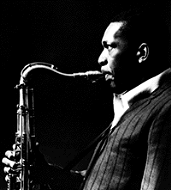John ColtraneTenor Saxophone |
 |
|---|
John ColtraneTenor Saxophone |
 |
|---|
"When he was with me the first time, people used to tell me to fire him. They said he wasn't playing anything."
--Miles Davis
So much has been written about how far John Coltrane stretched the improvisatory dimensions of jazz that I would prefer to focus on the extraordinary spirit that powered all that searching. Whenever we talked during his last years, Trane would always bring the conversation to the unyielding need he felt to keep going as deeply as he could into his feelings, his very soul. He often used the word "cleansing," for what he sought was an order of inner peace that transcended passing worries and vexations.
But he knew there was no easy way to get there--one had to continually scour oneself, confront oneself, and in the process try to connect with the unity at the source of all life. It was this concept of going through stages of self-knowledge which accounted in part for his interest in Eastern religion and philosophy. And it was the fulfilling of this concept in his music that accounted for its seizing, spiraling intensity--and also for its passages of uncommon calm and grace.
For all the unsparing passion and necessary tension in his music, Coltrane in the last years was an exceptionally gentle, patient man to talk to. There was also in him a huge generosity of spirit. Many young musicians have witnessed to the encouragement he gave them, the time he would take with them.
And although I expect he was dissatisfied with whatever stage he had reached--always needing to look deeper and higher--I can say that he was one of the exceedingly few men I've known who did not feel in competition with anyone, who bore no malice to anyone, and who lived the conviction that man is perfectible, that man has only just begun to realize his capacities to open up himself and the world through satyagraha--truth force.
In the talks I had with him, there was, however, an increasing area of reticence. Toward the end, he did not want to go into detail about his music, feeling that the music itself spoke for itself, and that words got in the way. And, in fact, he wished finally that there be no liner notes for his albums.
I used to marvel, listening to Coltrane at a club, listening to these recordings when they were first issued, that so much could be told through a horn. And indeed there is so much there that repeated listenings reveal new nuances, new overtones of feeling, newly unexpected responses from the listener.
In essence, that was the power of Coltrane--he drew you into his vortex deeper and deeper and deeper until you began to realize that it was your own self you were excavating. When I listen to Coltrane, no distractions are possible because the tidal pull of that spirit force is so strong, so real.
I am not religious in any traditional sense. My only faith is in what man can achieve. And it is a very small number of men who continue to nurture that faith. Coltrane was one of them. I remember hours in the dark of a nightclub during which I was, quite simply, listening with awe. Awe at how much that man kept finding to say and kept making me look for in myself.
I haven't the slightest doubt that decades from now, if we survive at all, the impact of Trane will still be palpable. His horn will still be probing into every spirit within its range.
--NAT HENTOFF, from the liner notes,
The Best of John Coltrane, 1970, Atlantic.
A selected discography of John Coltrane albums.
| Find John Coltrane on Amazon.com | Find John Coltrane on eBay.com | |
|---|---|---|
| John Coltrane CDs on Amazon | John Coltrane CDs on eBay | |
| John Coltrane DVDs & Videos on Amazon | John Coltrane LPs on eBay | |
| John Coltrane BOOKs on Amazon | John Coltrane DVD / VHS on eBay | |
| John Coltrane BOOKs on eBay |
 Music |
 Home |
 Musicians |
|---|
|
Any comments, additions or suggestions should be adressed to:
The Hard Bop Homepage / Eric B. Olsen / ebolsen@juno.com |
Other Web Sites:
The Film Noir 'net A History of Horror The War Film Web Author Eric B. Olsen |